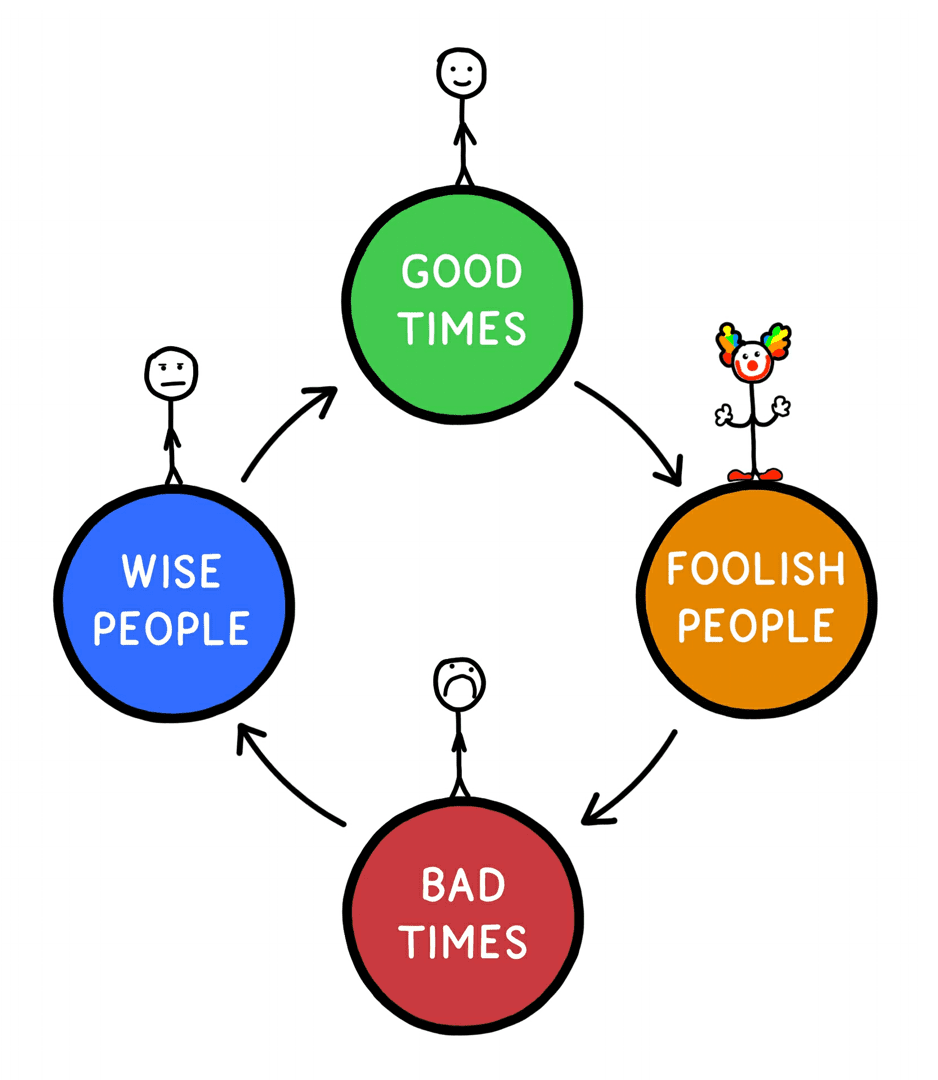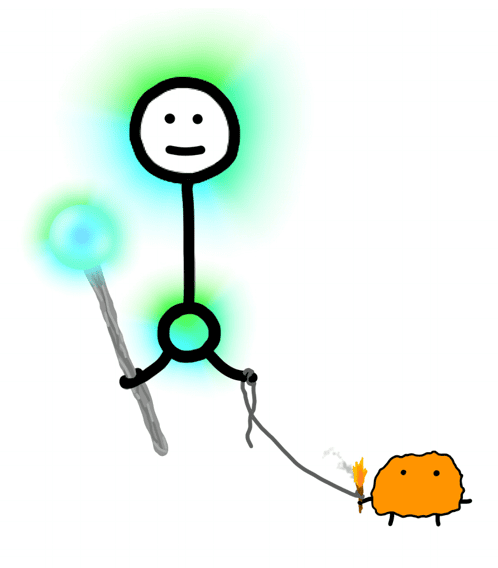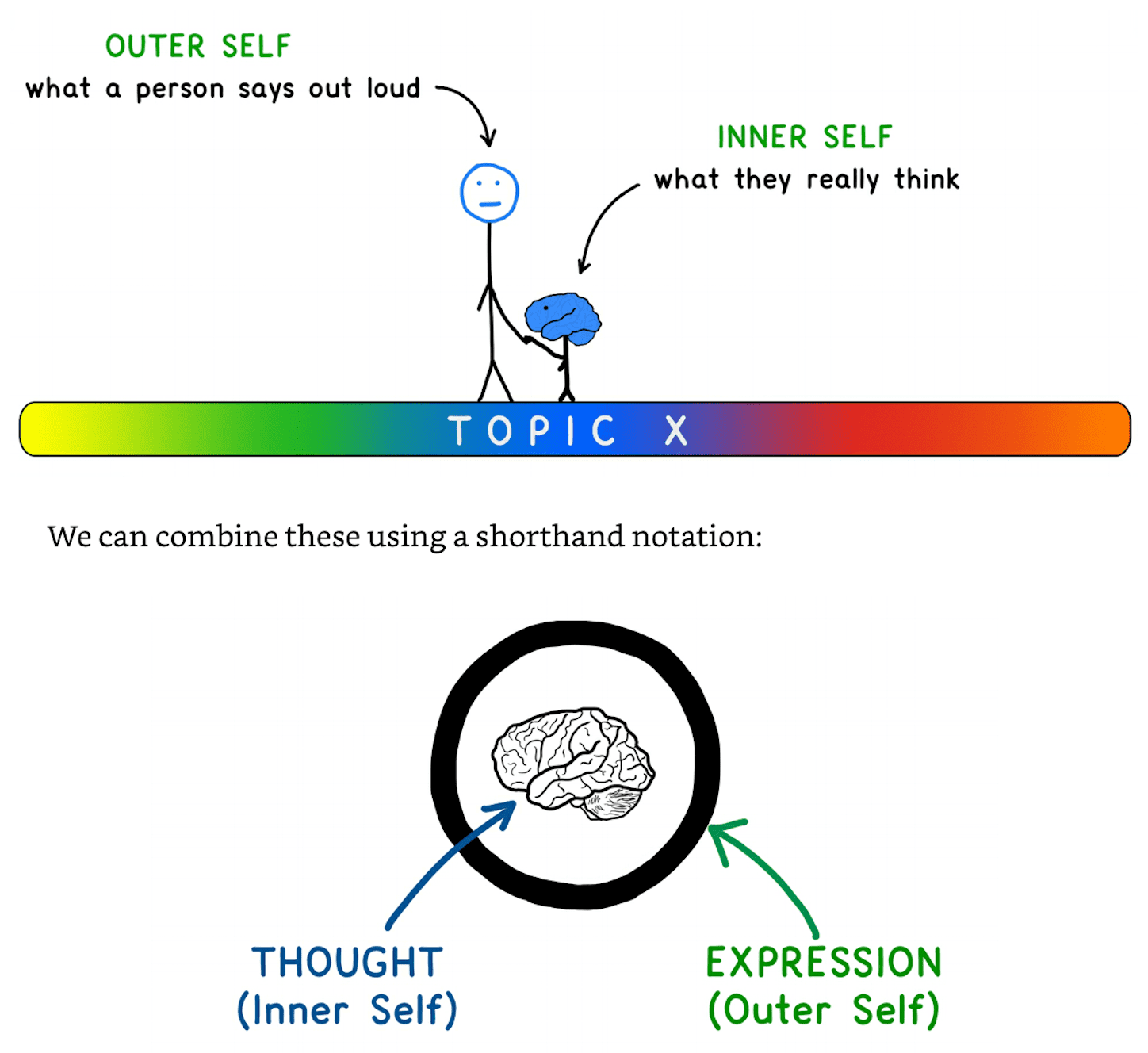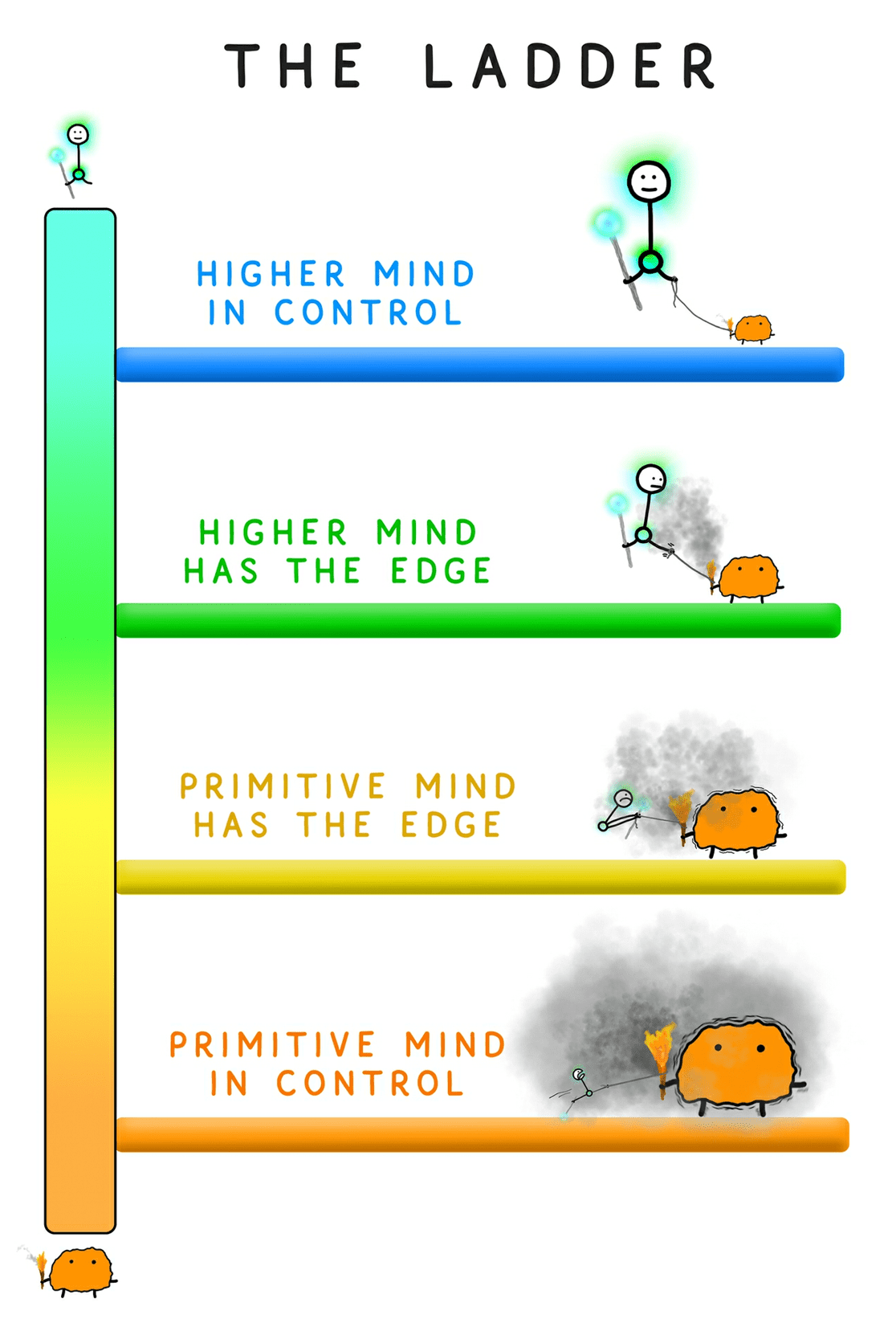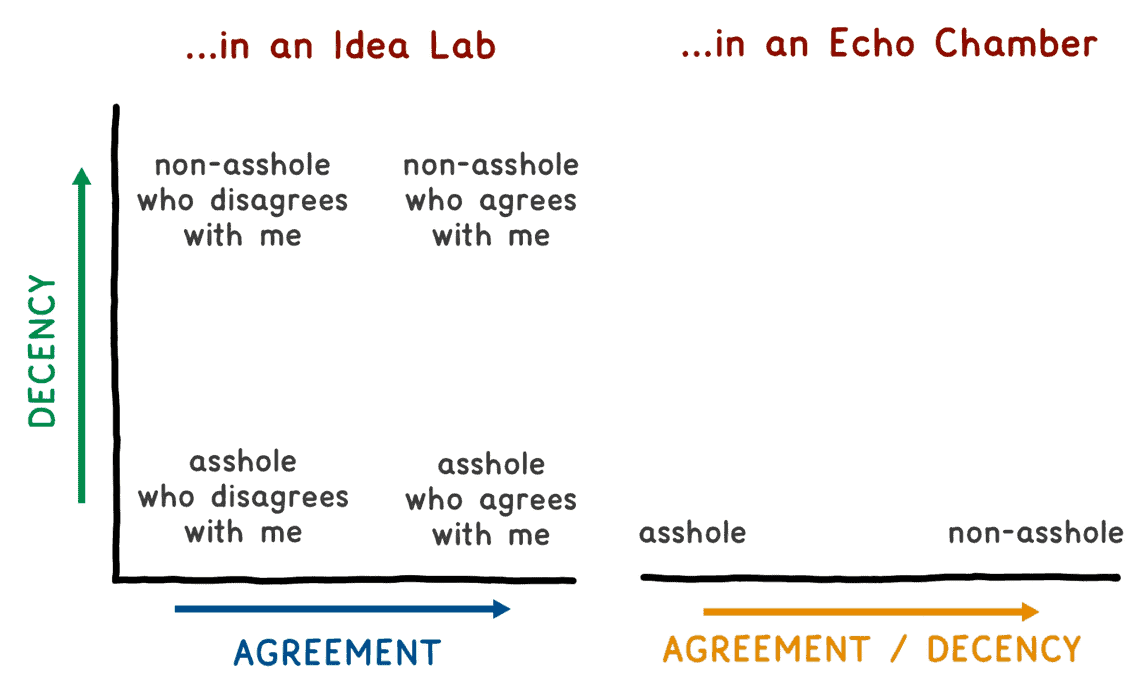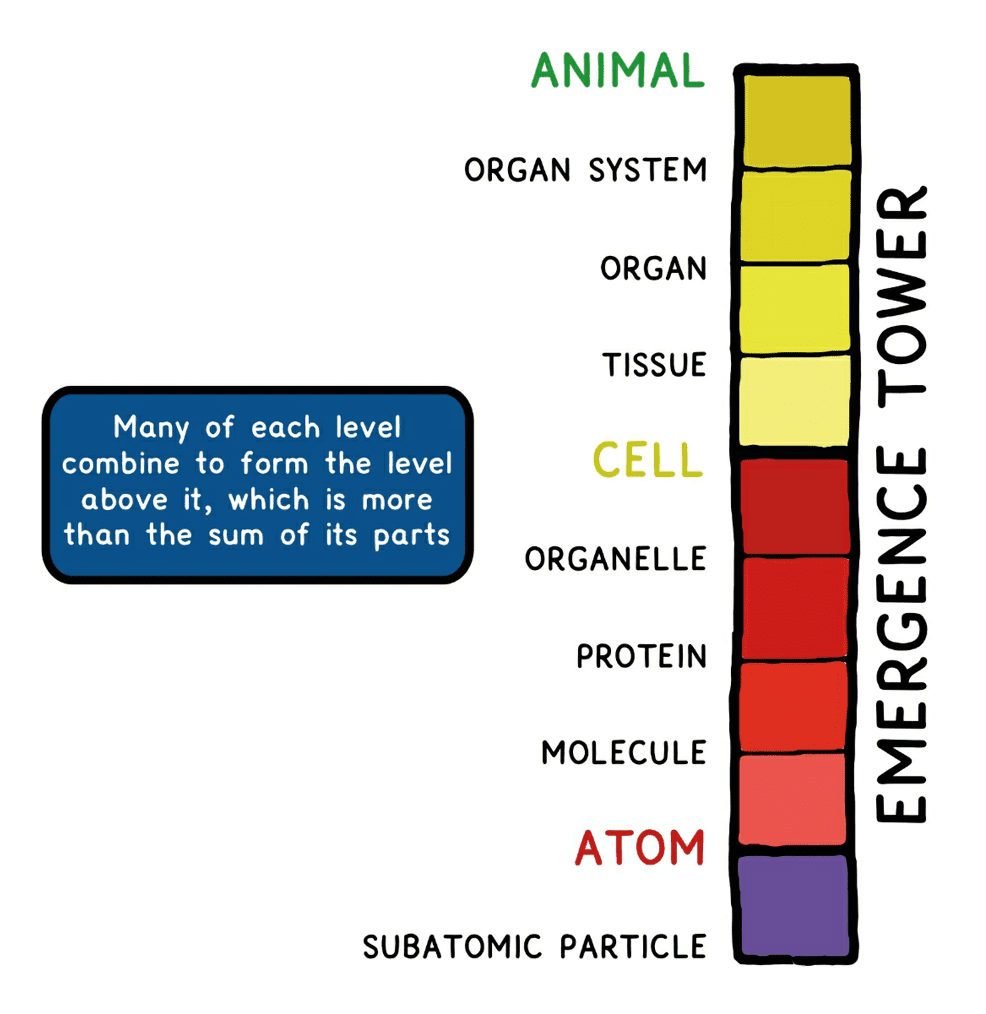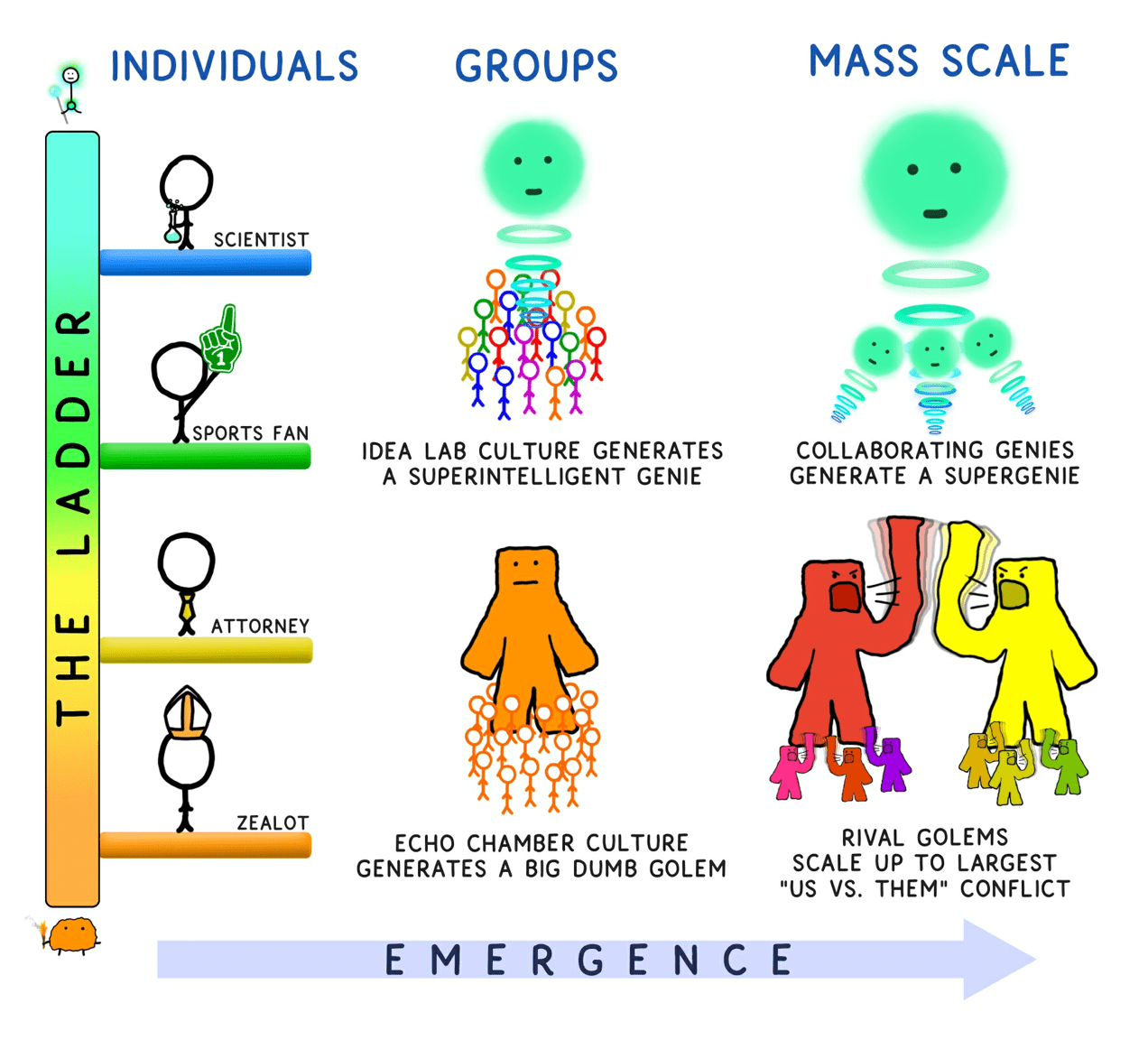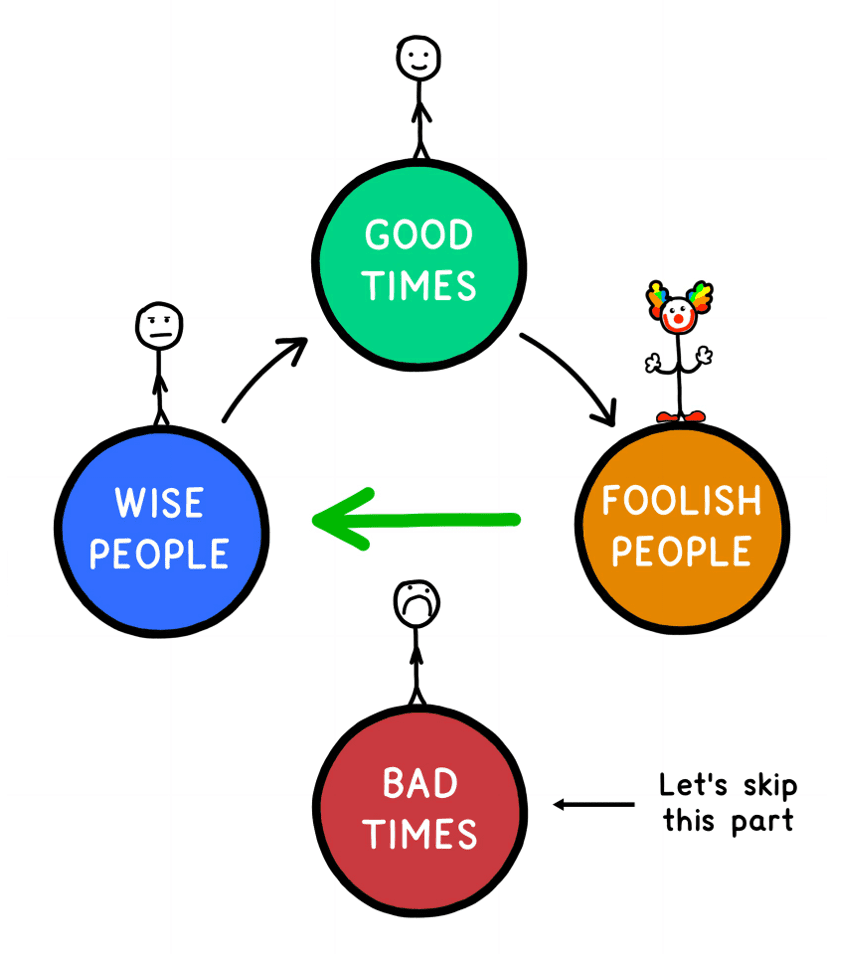This is a book summary of What’s Our Problem?: A Self-Help Book for Societies by Tim Urban of Wait But Why (Amazon).
For a video intro to Tim Urban and the book:
Quick Housekeeping:
- All content in quotation marks is from the author (content not in quotations is paraphrased).
- All content is organized into my own themes (not necessarily the author’s chapters).
- All images are sourced from the book.
- Emphasis has been added in bold for readability/skimmability.
- Special note: I’m not personally interested in current events or politics, so this book summary doesn’t include HUGE parts of the book dedicated to those topics. I’m interested in better thinking and more wisdom, so I’ve focused on those topics here.
Book Summary Contents:
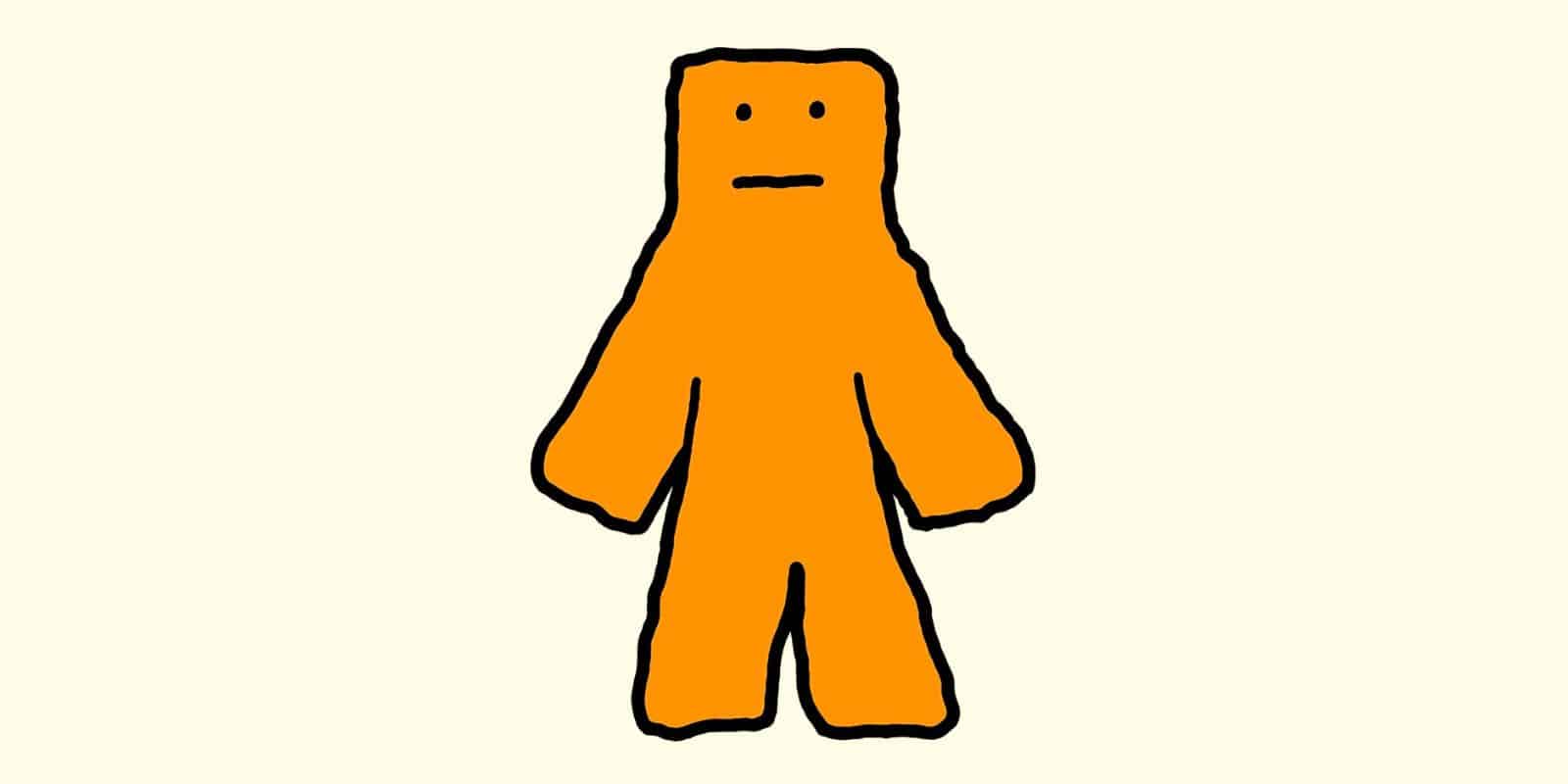
Self-Help for Societies: What’s Our Problem? by Tim Urban (Book Summary)
The Problem
“What’s our problem? Why, in a time so prosperous, with the stakes so high, would we be going backward in wisdom?”
Exponential technology means higher stakes:
- “It’s natural to assume that the world we grew up in is normal. But nothing about our current world is normal. Because technology is exponential. More advanced societies make progress at a faster rate than less advanced societies—because they’re more advanced.”
- “Technology is a multiplier of both good and bad. More technology means better good times, but it also means badder bad times.”
- “As the times get better, they also get more dangerous. More technology makes our species more powerful, which increases risk. And the scary thing is, if the good and bad keep exponentially growing, it doesn’t matter how great the good times become. If the bad gets to a certain level of bad, it’s all over for us.”
Environment changed faster than the human mind:
- “Human nature is a specific software program optimized for a specific purpose: survival in a small tribe, a long time ago. The modern world is nothing like the environment we were made for.”
- “Human nature is a constant, and when you put that constant into different environments, it produces different behavior. That makes environment the independent variable. And human environments are complicated—they include the physical environment, the surrounding people and cultures, the prevailing beliefs and belief systems, and the laws and rules.”
- “Human environments are made up of a complex fabric of culture, norms, values, laws, and prevailing beliefs. Changes to any element of our environment can trigger changes in other parts of the environment, which in turn can cause more changes.”
- “Our environment has been changing at breakneck speed.”
- “As great as civilization may be, 500 generations isn’t enough time for evolution to take a shit. So now we’re all here living in this fancy new habitat, using brain software optimized to our old habitat.”
We don’t have enough wisdom:
- “As the authors of The Story of Us, we have no mentors, no editors, no one to make sure it all turns out okay. It’s all in our hands. This scares me, but it’s also what gives me hope. If we can all get just a little wiser, together, it may be enough to nudge the story onto a trajectory that points toward an unimaginably good future.”
- “With the stakes this high, we’d want to be our wisest selves.”
- “Wisdom lessons don’t always seem to stick. Unlike technological growth, wisdom seems to oscillate up and down, leading societies to repeat age-old mistakes.”
- “Humans are supposed to mature as they age—but the giant human I live in has been getting more childish each year. Tribalism and political division are on the rise. False narratives and outlandish conspiracy theories are flourishing. Major institutions are floundering. Medieval-style public shaming is suddenly back in fashion. Trust, the critical currency of a healthy society, is disintegrating. And these trends seem to be happening in lots of societies, not just my own.”
- “This is an unfortunately common pattern through history. People who live through bad times, like the world wars, witness the fragility of human civilization firsthand. This harsh dose of reality has them saying, ‘never again,’ which gets their priorities in order and leads to wise decisions. These wise decisions protect future society from the kind of bad times they experienced. But when times are good for long enough, we start to get cocky. We forget that the only reason times are good is because of principles fervently agreed upon by people who had been through hell. When we grow complacent about those principles, the safeguards put in place by older generations deteriorate. And the people of good times never see the rise of new bad times until it’s too late to stop them. It’s kind of like a merry-go-round that societies get stuck on:”
Two Minds
“Two very different types of intellectual motivation exist simultaneously in our heads … Internal disagreement pops up in many parts of life, like a constant tug-of-war in our heads—a tug-of-war over our thoughts, our emotions, our values, our morals, our judgments, and our overall consciousness.”
Primitive Mind:
“Primitive bliss is great, as long as it’s managed by the Higher Mind, who makes sure it’s done in moderation, it’s done for the right reasons, and no one gets hurt.”
- goal is confirmation of its existing beliefs.
- a set of coded instructions for how to be a successful animal in the animal’s natural habitat (the coder is natural selection).
- wants to survive and reproduce (and help its offspring reproduce).
- what’s important is holding beliefs that generate the best kinds of survival behavior (whether or not those beliefs are actually true).
- beliefs are usually installed early on in life (often based on the prevailing beliefs of your family, peer group, or broader community).
- sees beliefs as a fundamental part of your identity (and a key to remaining in good standing with the community around you).
- wants you to treat your beliefs as sacred objects and believe them with conviction (the last thing it wants is for you to feel humble about your beliefs or interested in revising them).
- favorite things include viewpoint/identity confirmation, out-group bashing, and gossip.
Higher Mind:
“When the Higher Mind is winning the tug-of-war, its staff illuminates our minds with clarity, including awareness of the Primitive Mind and what it’s up to. The Higher Mind understands that primitive pleasures like sex, food, and all-in-good-fun tribalism like sports fandom are enjoyable, and often necessary, parts of a human life. And like a good pet owner, the Higher Mind is more than happy to let the Primitive Mind have its fun.”
- goal is to get to the truth.
- looks around and see the world for what it really is.
- sees that you live in an advanced civilization (and it wants to think and behave accordingly).
- thinks outside itself, self-reflect, and get wiser with experience.
- aware that humans are often delusional (and it wants you to be not delusional).
- sees beliefs as the most recent draft of a work in progress, and as it lives more and learns more, is always happy to make a revision (a signal of progress of becoming less ignorant, less foolish, less wrong).
- not very good at managing the Primitive Mind.
Two Selves
“Putting the Higher Mind and Primitive Mind aside for a minute, let’s break every human into two parts another way: their Outer Self and their Inner Self … When a person is being honest and saying what they really think, the thoughts of the Inner Self pass unimpeded through the Outer Self and out into the world … When a person isn’t allowed to say what they think, their ideas become quarantined inside their head, isolated from the outside world. From the communal brain perspective, where each individual human mind is a single neuron in a larger brain, it’s as if the axons of the neurons have been hijacked, and any real neural communication ceases.”
Inner Self (Thought):
- represents what a person really thinks.
Outer Self (Expression):
- represents what a person says out loud.
The Ladder
“The book’s primary tool—a framework that I’ve spent the past six years developing, testing, and refining. I call it the Ladder. The Ladder is a thinking lens—a pair of glasses for the brain to help us better understand the world and ourselves … For most beliefs, we’re so concerned with where people stand that we often forget the most important thing about what someone thinks: how they arrived at what they think. This is where the Ladder can help. If the Idea Spectrum is a ‘what you think’ axis, we can use the Ladder as a ‘how you think’ axis.”
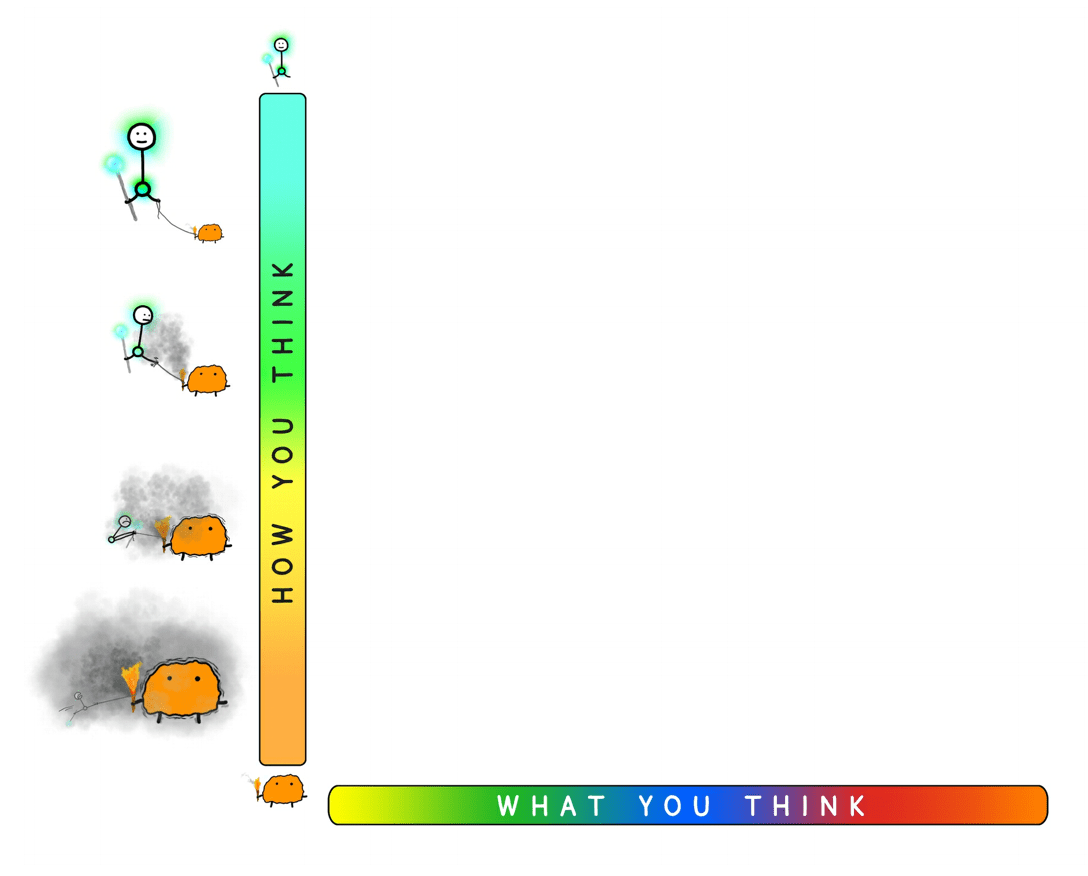
High-Rung Thinking (Scientist & Sports Fan):
“High-rungness seems to be losing its grip on our society’s thinking, its norms, its behavior … The high-rung immune system is the product of a culture of open discourse, debate, and moral consistency—and the willingness of its members to stand up for that culture in the face of inevitable attempts, from inside and out, to shut it down.”
- truth is the primary value (of high-rung intellectual culture).
- productive and independent thinking (leaving you free to revise your ideas or even discard them altogether).
- humble (the humility of the high-rung mindset makes your mind a permeable filter that absorbs life experience and converts it into knowledge and wisdom).
- self-aware, free of bias, and exposes logical fallacies (and roots them out).
- forms hypotheses from the bottom up and follows evidence wherever it takes you (default position on any topic is ‘I don’t know’).
- unattached to any particular ideas and continually willing to revise your beliefs (rather than adopt the beliefs and assumptions of conventional wisdom, you puzzle together your own ideas, from scratch).
Low-Rung Thinking (Attorney & Zealot):
“When I look out at the world today, I see a rising epidemic of low-rung thinking and behavior … Low-rung thinking, low-rung morality, and low-rung tactics all stem from the same concept: When the Primitive Mind is running the show, our minds are in ancient survival mode.”
- working to dutifully serve your ideas, not the other way around (when there’s no amount of evidence that will change your mind about something, it means that idea is your boss).
- arrogant (makes your mind a rubber shell that life experience bounces off of).
- short-sighted and small-minded (thinking and acting with our pettiest emotions).
- low on self-awareness and high on hypocrisy (we’re our worst selves).
- the great catch-22 of our species (the biggest threat to humanity is low-rung humanity, and low-rung humanity persists because it has often been the best defense against this very threat).
- idea supremacy (= low-rung thinking + authoritarianism).
Intellectual Cultures
“We can define ‘culture’ as the unwritten rules regarding ‘how we do things here’ … A group’s culture influences its members with a social incentive system. Those who play by the culture’s rules are rewarded with acceptance, respect, and praise, while violating the culture will result in penalties like ridicule, shame, and ostracism … In the same way the two aspects of your mind compete for control over how you think, a similar struggle happens on a larger scale over how the group thinks. Higher Minds can band together with other Higher Minds and form a kind of coalition, and a group’s collective Primitive Minds can do the same thing.”
Idea Labs:
- “When the rules of a group’s intellectual culture mirror the values of high-rung thinking, the group is what I call an Idea Lab. An Idea Lab is an environment of collaborative high-rung thinking. People in an Idea Lab see one another as experimenters and their ideas as experiments. Idea Labs value independent thinking and viewpoint diversity … In an Idea Lab—where people don’t hesitate to tell you when you’re wrong or biased or hypocritical or gullible—humility and self-awareness are inflicted upon you.”
Echo Chambers:
- “While Idea Labs are cultures of critical thinking and debate, Echo Chambers are cultures of groupthink and conformity. Because while Idea Labs are devoted to a kind of thinking, Echo Chambers are devoted to a set of beliefs the culture deems to be sacred.”
Emergence Tower
“I picture society as a giant human—a living organism like each of us, only much bigger … This concept—a bunch of smaller things joining together to form a giant that can function as more than the sum of its parts—is called emergence. We can visualize it using an Emergence Tower … In the same way we bounce up and down the Ladder, we’re all over the place on the Emergence Tower … It’s as if there’s an elevator in the Emergence Tower, and our minds take regular trips up and down.”
Genies:
“Your brain is a giant of its own, made up of a network of 86 billion neurons … Language is so important because it allows individual brains to connect, like neurons, to form a larger thinking system: a communal brain … This is the magic of Idea Lab culture. While individual thinking suffers from bias, a diversity of biases helps the communal brain reduce blind spots.”
- “The result is a multi-mind thinking system that’s superior to any of its individual members at learning new things and separating truth from fiction. Let’s call this thinking system a genie.”
- “None of this collaboration comes at the expense of the individual. Quite the opposite, as genies flourish when its members are independent thinkers. So people in a genie get the best of all emergence worlds: they can simultaneously thrive as free individuals and as smaller pieces of a larger system.”
- “The civilization you’re living in today, with all of its incredible technology, wasn’t created by humans. Humans aren’t nearly smart enough to do that. The amazing world around you was created by genies.”
Golems:
“If the genie is the product of human collaboration, the golem is the emergent property of human obedience. Golems are what happen when humans act like ants … If the genie is the ultimate Scientist, the golem is the ultimate Zealot—a giant that’s totally certain of itself, totally unable to learn or change its mind, and worse at thinking than the average human.”
- “The human cognitive weaknesses a genie tries to mitigate are the golem’s strengths. Confirmation bias tricks like cherry-picking, motivated skepticism, and motivated reasoning benefit hugely from economies of scale, as the snappiest and most convincing articulations of the sacred ideas spread quickly through the system. Individual biases, all pointing in the same direction in an Echo Chamber, scale up to make the golem’s ultra-biased macro-mind. And while individual minds inside a golem may have doubts about the sacred ideas, the social pressure of Echo Chamber culture keeps the giant as a whole steadfast in its beliefs.”
- “Golems don’t just prefer the Us vs. Them mindset, they rely on it.”
- “A golem’s lifeblood is conformity, anchored by its members’ steadfast belief in its guiding narrative. The stronger and more unified the belief, the stronger and more powerful the golem.”
- “If golems are on the rise, it’s not because people have changed biologically—it’s because something has changed about the environment.”
- “Golems have infected the societies’ vital organs—their institutions—impeding their ability to function properly and causing a mass crisis of trust.”
The Solution
“How does a society get out of a downward spiral of confusion and fear? With its opposite: an upward spiral of awareness and courage.”
- “No society wants to enter the ‘bad times’ phase of the merry-go-round. In a super high-tech era like ours, it’s an especially scary prospect. We live in a time of magical technology, and the power of the human species grows more godlike every year. This power is a double-edged sword, simultaneously paving one road to utopia and another to dystopia. As we move into the deeply uncertain future…there’s never been a more important time to have our wits about us. Which is also why there’s never been a worse time for us to be spiraling down a vortex of confusion and fear. Exponential technology has given us countless gifts. But in the frenzy, we’re forgetting the most important lesson of all: the worst of our nature never lies far beneath the surface … We really can’t afford to get ourselves from foolish to wise the usual way, via bad times. Somehow, we have to figure how to become wise people directly.”
Awareness (an Inner Self project):
“The first part of our solution is awareness, and the gateway to awareness is humility … The most important thing for us to remember is that we do our rational and moral thinking with a not-that-smart tool that was designed to keep an ancient primate alive. Staying aware of this can help us be our wisest selves and reach our potential … So the first call to action is: Put your own mask on before helping others.”
- “Do a self-audit: Where in your internal life is your Primitive Mind holding the reins? What are the triggers that activate your Primitive Mind and leave you buried in fog? Where do you tend to be at your best—consistently high rung, wise, and grown up? What is it about those moments that gives your Higher Mind such a strong advantage? Can you replicate that elsewhere?”
- “Think about your beliefs: Play the ‘why’ game with them, like an annoying four-year-old. Why do you believe what you believe? When did those ideas become your beliefs? Were they installed in you by someone else? Are they beholden to some tribe’s checklist of approved ideas? If they are authentically yours, when were they last updated? Your Primitive Mind thinks your beliefs are sacred objects carved in stone, but they’re not—they’re hypotheses written in pencil, and if you’re thinking up on the high rungs, you should probably be pretty active with the eraser.”
- “Think about your values: If you love a political party or a movement because it stands for your values, and that party or movement slides away from those values, are you sticking with it out of tribal loyalty? Or because your values have truly changed alongside it? If the party or movement has departed from your real values, stick with your values. If you do, you’ll be accused of having changed—of having ‘left’ the party or movement. But that’s not what happened. It left you, and you stayed true to yourself.”
- “Think about the beliefs of those you disagree with: Do they have any merit? Could you state them to your opponent, in all their complexity, in a way that would make your opponent say, ‘Yup, that’s what I believe’? Or would you oversimplify or misrepresent those beliefs? If you can’t steel man your opponent’s beliefs, you don’t yet know whether you disagree with them or not. Everyone believes they are fighting on the side of the good, the right, the vulnerable—even your opponents.”
- “Think about your identity: The truth is, you’re not a progressive or a conservative or a moderate or radical or some other political noun. Those are words for ideas, not people. Your mind is way too weird and particular to be locked in a noun or adjective prison. Attaching a political category to your identity is a heavy piece of baggage to carry around, and putting it down makes learning and exploring much easier and less stressful.”
- “Think about people or groups you hate: Who are you disgusted by? Remind yourself that this is almost always a delusion of your Primitive Mind. You certainly don’t have to like everybody. But when you’re disgusted by a person or a group of people, you’ve gotten swallowed up by human craziness. When you find yourself here, try one of these exercises to snap yourself out of it: 1) Think small. Imagine the little details of the life of the person you’re hating: the sticky note they leave in their kid’s lunchbox, the calendar on their wall with little plans written in the squares, the leftovers in their fridge from last night’s home-cooked meal. Like you, everyone else is ultimately just trying to be happy. 2) Think big. Read about the universe. Nothing makes hatred seem more ridiculous than internalizing how vast time and space are. Doing so makes me want to turn to anyone who will listen and hug them and say, ‘We both exist! On the same tiny planet at the same exact time! Hi!’ 3) Think outside yourself. Every person has a unique childhood, a unique set of traumas, unique mental health issues. There are many people not lucky enough to be born as intellectually or emotionally intelligent as you were, not lucky enough to have an upbringing like yours. You have no idea what kind of grief, heartbreak, or other misfortune another person may be suffering through. However awful someone is acting, it would probably make a lot more sense if you could spend a few minutes inside their brain.”
- “Practice thinking ‘vertically’ about your society, its industries, its cultures, its politics. Slap the Ladder onto all these things and see what they look like. Where do you see high-rung and low-rung psychology or behavior playing out?”
- “Each of us is a work in progress. We’ll never rid our lives of low-rung thinking, but the more we evolve psychologically, the more time we spend thinking from the high rungs and the less time we spend down below. Improving this ratio is a good intellectual goal for all of us.”
Courage (an Outer Self project):
“Awareness is a necessary but not sufficient condition for us to right the ship. Because awareness + silence changes nothing. This is where the second ingredient comes into play … Awareness is about looking out at the world and being able to discern the difference between the low-rung virus and the high-rung immune system. Courage is about becoming part of the immune system instead of enabling the virus … Just as confusion and fear are contagious, so are awareness and courage. When a person finds the courage to share their real ideas, those ideas spread and build awareness in others.”
- “Courage level 1: Stop saying stuff you don’t believe … Saying things you don’t believe because others want you to is disrespecting your Inner Self. And your Inner Self deserves better.”
- “Courage level 2: Start saying what you really think, in private, with people you know well … This is when you begin letting your Inner Self show itself in public. Start with the people you’re closest with.”
- “Courage level 3: Go public … Class. Work. Church. Book clubs. Dinner parties. This isn’t an encouragement to become the insufferable person who always brings up politics. But if you’re in a setting where a conversation is happening and your Inner Self is screaming ‘I disagree!’—start saying, ‘I disagree.’ I can almost guarantee that at least some other people in the room will secretly be harboring the same thoughts, and they’ll respect the shit out of you for saying it out loud. You could go even bigger. Start a blog. Start a podcast. Write a book. Tweet a tweet. Spend six years writing a 120,000-word ebook/audiobook. If you already have a platform, start laying your Inner Self on it.”
- “The danger we face is not an asteroid racing toward Earth or an impending alien invasion—but only ourselves. We got ourselves into this, and I’m pretty sure we can get ourselves out of it.”
- “There was no shortage of ideas in this book, but I believe one stands out above all: Us vs. Them is always a delusion. The Story of Us isn’t a story of good guys vs. bad guys but one about the tug-of-war that exists within each human head, each community, each society. In this epic story, heading together toward an uncertain fate, there is no Them. Just one big Us.”
You May Also Enjoy:

